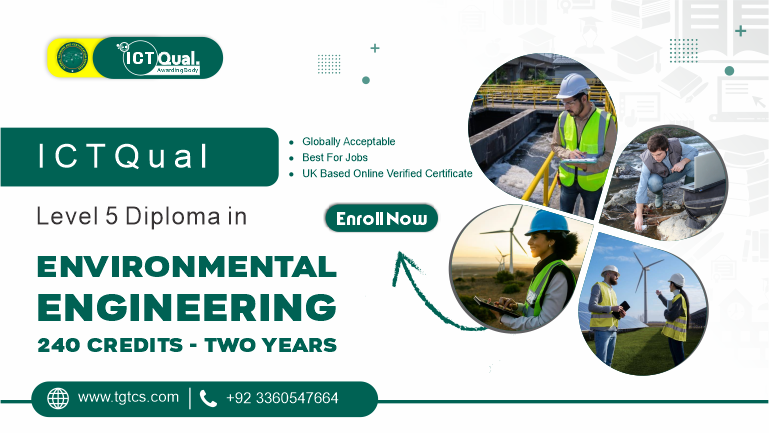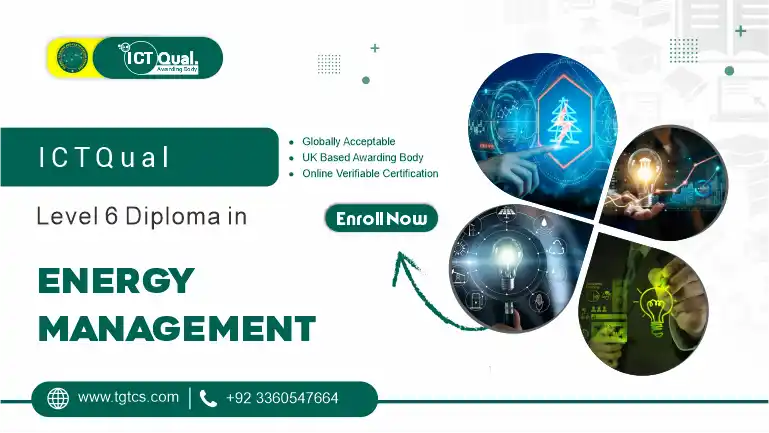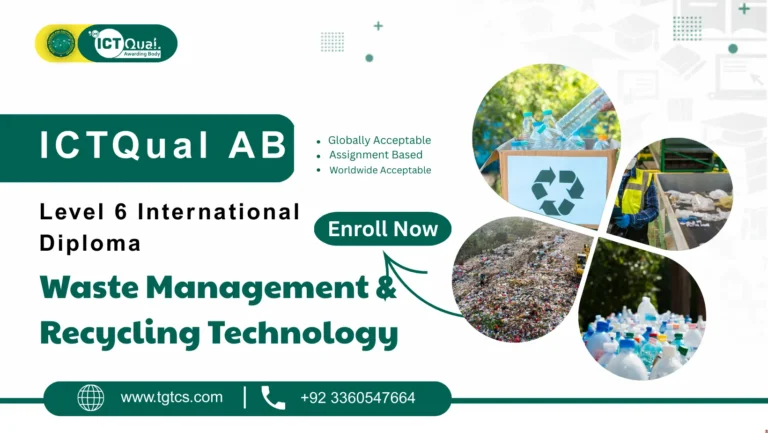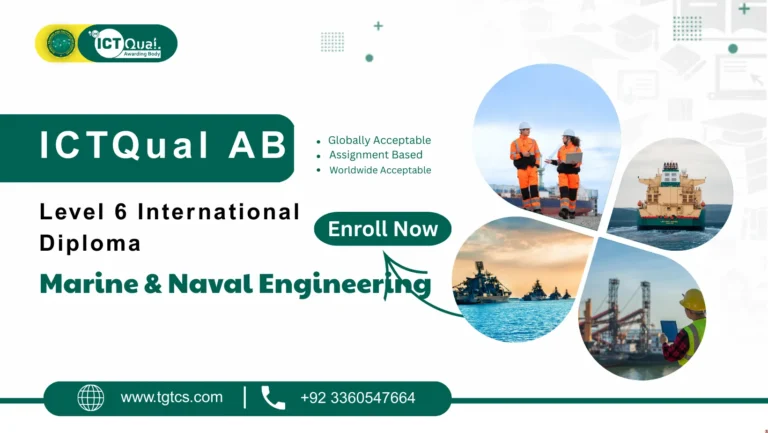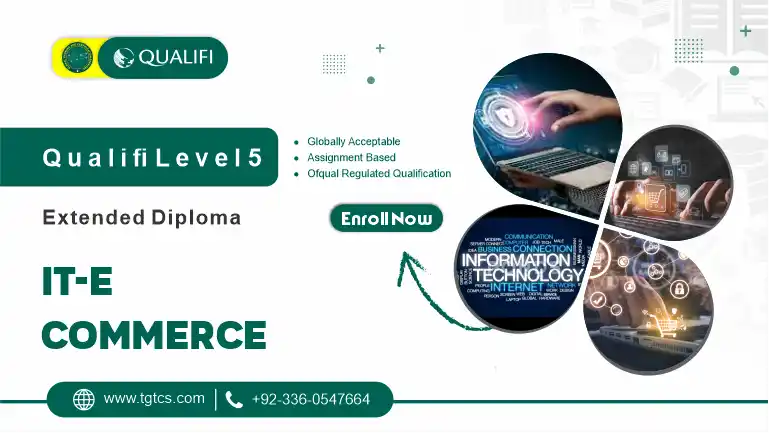ICTQual Level 5 Diploma in Environmental Engineering 240 Credits – Two Years
The ICTQual Level 5 Diploma in Environmental Engineering (240 Credits – Two Years) is the perfect qualification for those eager to build a career in the rapidly growing field of environmental engineering. This comprehensive program provides you with advanced skills and knowledge to address critical environmental challenges, such as climate change, pollution control, and sustainable resource management.
The ICTQual Level 5 Diploma in Environmental Engineering is a prestigious qualification designed to equip students with the essential knowledge, practical experience, and specialized skills needed to thrive in the field of environmental engineering. Over the course of two years, students will gain a deep understanding of environmental systems, sustainable practices, and the technologies used to mitigate environmental damage.
The application process for the ICTQual Level 5 Diploma in Environmental Engineering is straightforward. Candidates are typically required to have a background in science, technology, engineering, or mathematics (STEM), although those with relevant professional experience may also be considered. Applicants should check with the institution offering the course for specific entry requirements.
The ICTQual Level 5 Diploma in Environmental Engineering is a powerful stepping stone for anyone passionate about sustainability and looking to build a rewarding career in environmental engineering. With the skills and knowledge gained from this diploma, graduates can make a meaningful contribution to solving some of the most pressing environmental challenges of our time, while advancing their careers in a rapidly growing sector.
The Global Training and Certification Services (TGTCS) is Directly Approved Training Centre of ICTQual
The ICTQual Level 5 Diploma in Environmental Engineering (240 Credits – Two Years) is a comprehensive qualification designed to provide learners with advanced knowledge and practical skills in environmental engineering. This course covers key topics such as pollution control, waste management, water treatment, renewable energy, and sustainable infrastructure. Through a blend of theoretical learning and hands-on experience, students gain a deep understanding of environmental systems and technologies used to address global environmental challenges.
Over two years, learners develop expertise in critical areas like environmental impact assessment and sustainability practices, preparing them for a wide range of careers in the environmental sector. Graduates can pursue roles such as environmental consultants, renewable energy engineers, sustainability officers, and environmental compliance specialists. Additionally, the qualification offers pathways for further academic progression, with options to specialize in areas like renewable energy engineering or environmental management.
This internationally recognized diploma equips students with the skills needed to make a meaningful impact on sustainability and environmental protection, opening doors to global career opportunities in both the public and private sectors.
Mandatory Units
The Units of Level 5 Diploma in Environmental Engineering 240 Credits-Two Years are as :
Year 1:
- Introduction to Environmental Science
- Fundamentals of Environmental Engineering
- Sustainable Development Practices
- Climate Change and its Impacts
- Pollution Control Technologies
- Energy Systems and Environmental Impact
- Environmental Legislation and Policy
- Water Quality Management
- Waste Management and Resource Recovery
- Environmental Risk Assessment
- Environmental Health and Safety
- Introduction to Renewable Energy
Year 2:
- Ecosystem and Biodiversity Management
- Environmental Data Collection and Analysis
- Environmental Monitoring and Reporting
- Advanced Environmental Engineering
- Renewable Energy Technologies
- Environmental Economics and Sustainability
- Land Rehabilitation and Restoration
- Environmental Impact Assessment (EIA)
- Green Building and Sustainable Infrastructure
- Pollution Prevention and Waste Minimization
- Environmental Management Systems (EMS)
- Sustainable Transport and Mobility
Year 1: Learning Outcomes
Introduction to Environmental Science
- Gain an understanding of basic environmental science concepts, ecosystems, and biodiversity.
- Recognize human impacts on the environment and the critical importance of sustainability.
Fundamentals of Environmental Engineering
- Demonstrate knowledge of core environmental engineering principles and practices.
- Apply engineering solutions to tackle environmental challenges.
Sustainable Development Practices
- Develop an understanding of sustainable development theories and practical applications.
- Analyze strategies for balancing environmental, economic, and social factors.
Climate Change and Its Impacts
- Understand the causes and effects of climate change on ecosystems and human societies.
- Evaluate strategies for mitigation and adaptation to combat climate change.
Pollution Control Technologies
- Identify pollution control technologies for air, water, and soil.
- Assess the effectiveness of various pollution control methods in different contexts.
Energy Systems and Environmental Impact
- Understand the environmental impact of traditional and alternative energy systems.
- Explore methods to reduce the environmental footprint of energy production.
Environmental Legislation and Policy
- Identify key environmental laws and policies at both national and international levels.
- Understand the role of government regulations in environmental protection.
Water Quality Management
- Learn techniques for assessing and improving water quality.
- Apply water management practices to prevent pollution and ensure sustainability.
Waste Management and Resource Recovery
- Examine waste management strategies and technologies.
- Promote resource recovery and recycling to reduce dependency on landfills.
Environmental Risk Assessment
- Understand environmental risk assessment methodologies.
- Analyze and manage potential environmental risks from both industrial and natural sources.
Environmental Health and Safety
- Identify health and safety risks in environmental engineering practices.
- Implement measures to protect public health and safety in environmental projects.
Introduction to Renewable Energy
- Learn about various renewable energy sources and their applications.
- Assess the environmental benefits and challenges of renewable energy systems.
Year 2: Learning Outcomes
Ecosystem and Biodiversity Management
- Understand ecosystem dynamics and strategies for biodiversity conservation.
- Develop management practices to protect and restore ecosystems.
Environmental Data Collection and Analysis
- Gain skills in collecting and analyzing environmental data.
- Use this data to inform decision-making in environmental engineering projects.
Environmental Monitoring and Reporting
- Learn methods for monitoring environmental quality and sustainability.
- Develop comprehensive environmental reports for stakeholders.
Advanced Environmental Engineering
- Apply advanced environmental engineering concepts to solve complex environmental issues.
- Evaluate engineering solutions for sustainability and long-term effectiveness.
Renewable Energy Technologies
- Explore advanced renewable energy technologies, including solar, wind, and bioenergy.
- Assess the feasibility and impact of integrating renewable energy into existing systems.
Environmental Economics and Sustainability
- Understand the economic principles of sustainability.
- Evaluate the cost-benefit analysis of environmental projects and their long-term economic viability.
Land Rehabilitation and Restoration
- Learn techniques for land restoration and rehabilitation after environmental damage.
- Design and implement land restoration projects to improve ecosystem services.
Environmental Impact Assessment (EIA)
- Gain expertise in conducting Environmental Impact Assessments (EIA) for various projects.
- Analyze the potential environmental effects of development and recommend mitigation strategies.
Green Building and Sustainable Infrastructure
- Understand sustainable building practices and green construction techniques.
- Integrate environmental considerations into infrastructure design and construction.
Pollution Prevention and Waste Minimization
- Develop strategies to prevent pollution at the source.
- Apply waste minimization techniques to reduce environmental impacts.
Environmental Management Systems (EMS)
- Learn how to design and implement Environmental Management Systems (EMS) in organizations.
- Promote environmental compliance and continuous improvement in sustainability practices.
Sustainable Transport and Mobility
- Understand sustainable transportation systems and their impact on urban planning.
- Evaluate policies and technologies to reduce transportation-related environmental damage.
The ICTQual Level 5 Diploma in Environmental Engineering offers a range of benefits for students aspiring to build a successful career in environmental engineering and sustainability. Here are the key advantages of pursuing this course:
1. Comprehensive Knowledge and Skills
- This diploma equips students with a thorough understanding of environmental science, engineering principles, and sustainable development practices. You’ll gain expertise in areas such as pollution control, climate change mitigation, renewable energy, and environmental legislation, preparing you to tackle complex environmental challenges.
2. Hands-On Learning Experience
- The course includes practical learning components, such as laboratory work, field trips, and real-world case studies. This hands-on approach ensures that you can apply theoretical knowledge to actual environmental problems, making you highly competent and job-ready upon graduation.
3. Specialization in Emerging Environmental Technologies
- With a focus on cutting-edge technologies like renewable energy systems, sustainable construction, and pollution control methods, the diploma allows students to specialize in high-demand areas that are critical for addressing global environmental issues.
4. Enhanced Career Prospects
- Graduates of this diploma are well-positioned to enter a wide range of environmental careers in sectors such as sustainability consulting, renewable energy, environmental compliance, and resource management. Roles include Environmental Engineer, Renewable Energy Specialist, Sustainability Manager, and Environmental Consultant, among others.
5. Pathways for Further Education
- The Level 5 Diploma provides a strong foundation for further academic progression. Graduates can pursue Level 6 Diplomas or advanced degrees in specialized areas like Environmental Impact Assessment, Sustainable Engineering, or Renewable Energy Systems, opening doors to more advanced career opportunities.
6. Global Career Opportunities
- The environmental field is rapidly expanding, with an increasing demand for skilled professionals globally. Graduates of this course can pursue careers not just locally, but in international markets, contributing to sustainable development projects worldwide.
7. Increased Industry Demand
- As the world faces environmental challenges like climate change, pollution, and resource depletion, the demand for trained environmental engineers continues to grow. This diploma ensures that you are prepared for the increasing need for professionals in the green economy, offering job security and career stability.
8. Sustainability and Impact
- One of the key benefits of this course is the opportunity to make a positive impact on the environment. By understanding and implementing sustainable practices, graduates will be empowered to contribute to environmental protection, reduce waste, mitigate climate change, and support the transition to a more sustainable future.
9. Professional Certification and Industry Recognition
- Upon completing the course, graduates will receive a recognized and respected qualification that can help advance your career in environmental engineering. Additionally, the knowledge gained in this course can be supplemented with industry certifications to further enhance your professional profile.
10. Flexibility and Accessibility
- The ICTQual Level 5 Diploma in Environmental Engineering is designed to cater to both full-time students and working professionals, offering flexible study options. This ensures that individuals can balance their education with other personal or professional commitments.
11. Networking and Industry Connections
- Throughout the course, students have opportunities to engage with professionals and experts in the environmental engineering field, through guest lectures, workshops, and internships. This fosters valuable connections that can support future career growth and job placement opportunities.
12. Competitive Edge in the Job Market
- The environmental engineering sector is highly competitive, but this diploma gives you a significant edge. With expertise in both environmental science and engineering solutions, you’ll stand out to employers looking for professionals who can innovate and address the urgent environmental challenges of today’s world.
By completing the ICTQual Level 5 Diploma in Environmental Engineering, you will be well-equipped to make a meaningful contribution to the field of environmental sustainability, advancing both your career and the global effort to protect and preserve the environment.
The ICTQual Level 5 Diploma in Environmental Engineering is designed for individuals who are passionate about sustainability and eager to address pressing environmental challenges. The ideal learner for this course possesses the following characteristics:
1. Interest in Environmental Sustainability
- The ideal learner has a strong interest in environmental science, sustainability, and engineering. They are driven to make a positive impact on the planet by solving environmental problems, such as pollution, climate change, and resource depletion.
2. Background in Science or Engineering
- This course is particularly suited for individuals with a background in science, technology, engineering, or mathematics (STEM). A foundation in subjects like biology, chemistry, physics, or engineering is beneficial, as it helps learners understand the core concepts of environmental engineering.
3. Problem-Solving Mindset
- The ideal learner is someone who enjoys problem-solving and critical thinking. Environmental engineering requires innovative solutions to complex environmental issues, and students should be ready to apply engineering principles to real-world challenges.
4. Desire for Career Advancement
- Learners who are looking to advance their careers in the environmental sector, or those aiming to switch careers into sustainability or environmental engineering, will benefit from this diploma. The course equips students with the specialized knowledge and practical skills required for roles such as Environmental Consultant, Sustainability Manager, or Renewable Energy Engineer.
5. Commitment to Continuous Learning
- Environmental engineering is a dynamic field, with new technologies, regulations, and challenges constantly emerging. The ideal learner should have a commitment to continuous learning and staying updated on the latest developments in environmental science and engineering.
6. Passion for Hands-On Learning
- This course offers practical, hands-on experiences, including laboratory work, field studies, and case studies. The ideal learner enjoys applying theoretical knowledge in real-world settings and is eager to engage in practical projects and learning experiences.
7. Strong Analytical Skills
- Environmental engineering involves data collection, analysis, and interpretation. The ideal learner should have strong analytical skills to assess environmental data and develop effective engineering solutions for sustainability.
8. Motivation to Contribute to Global Sustainability
- The ideal learner is motivated by the desire to contribute to global efforts to combat environmental issues such as climate change, pollution, and the depletion of natural resources. They seek to become part of the solution and help create a more sustainable future.
9. Good Communication Skills
- Effective communication is crucial in environmental engineering, particularly when working with stakeholders, reporting on findings, or advocating for sustainable practices. The ideal learner should be able to clearly communicate complex environmental concepts and solutions.
10. Interest in Specializing in Green Technologies
- The course offers a chance to specialize in areas like renewable energy, pollution control, and sustainable infrastructure. The ideal learner is enthusiastic about these technologies and wants to work in sectors that prioritize sustainability.
11. Capacity for Independent and Collaborative Work
- Environmental engineering often requires both independent work and teamwork. The ideal learner should be self-motivated and able to manage their studies independently, but also capable of collaborating effectively in group settings to solve complex environmental issues.
This course is ideal for individuals who are passionate about creating sustainable solutions to the world’s environmental challenges, eager to gain practical expertise in environmental engineering, and looking to make a tangible impact on global sustainability efforts.
Completing the ICTQual Level 5 Diploma in Environmental Engineering opens up numerous opportunities for both further education and career growth. Below are some potential pathways for graduates:
Professional Certifications
Graduates can enhance their credentials by obtaining industry-recognized certifications, which can improve employability, including:
- Certified Environmental Engineer (CEE)
- Environmental Management System Auditor
- Renewable Energy Specialist Certifications
Career Pathways
The diploma equips graduates with the skills and knowledge needed for a variety of roles within the environmental sector. Potential career options include:
- Environmental Engineer
- Sustainability Consultant
- Renewable Energy Specialist
- Environmental Compliance Officer
- Pollution Control Specialist
- Waste Management Coordinator
- Water Quality Analyst
Entrepreneurial Opportunities
Graduates may also choose to start their own businesses or consultancies in sustainability-focused fields, such as:
- Renewable energy firms
- Waste management solutions companies
Global Opportunities
This diploma is internationally recognized, offering graduates the flexibility to pursue careers or further education in global markets.
Overall, the ICTQual Level 5 Diploma in Environmental Engineering serves as both a foundation for higher qualifications and a catalyst for making a meaningful contribution to solving global environmental challenges.
Course Overview
Course Level
Level 5
Course Units
24 Mandatory Units
Duration
Two year
